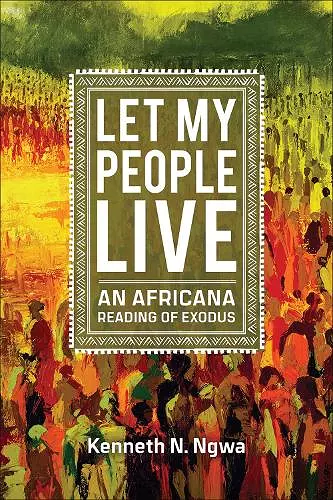Let My People Live
An African Reading of Exodus
Format:Paperback
Publisher:Westminster/John Knox Press,U.S.
Published:12th Apr '22
Currently unavailable, and unfortunately no date known when it will be back

Let My People Live reengages the narrative of Exodus through a critical, life-affirming Africana hermeneutic that seeks to create and sustain a vision of not just the survival but the thriving of Black communities. While the field of biblical studies has habitually divided "objective" interpretations from culturally informed ones, Kenneth Ngwa argues that doing interpretive work through an activist, culturally grounded lens rightly recognizes how communities of readers actively shape the priorities of any biblical interpretation. In the Africana context, communities whose identities were made disposable by the forces of empire and colonialism—both in Africa and in the African diaspora across the globe—likewise suffered the stripping away of the right to interpretation, of both sacred texts and of themselves. Ngwa shows how an Africana approach to the biblical text can intervene in this narrative of breakage, as a mode of resistance. By emphasizing the irreducible life force and resources nurtured in the Africana community, which have always preceded colonial oppression, the Africana hermeneutic is able to stretch from the past into the future to sustain and support generations to come.
Ngwa reimagines the Exodus story through this framework, elaborating the motifs of the narrative as they are shaped by Africana interpretative values and approaches that identify three animating threats in the story: erasure (undermining the community's very existence), alienation (separating from the space of home and from the ecosystem), and singularity (holding up the individual over the collective). He argues that what he calls "badass womanism"—an intergenerational and interregional life force and epistemology of the people embodied in the midwives, Miriam, the Egyptian princess, and other female figures in the story—have challenged these threats. He shows how badass womanist triple consciousness creates, and is informed by, communal approaches to hermeneutics that emphasize survival over erasure, integration over alienation, and multiplicity over singularity. This triple consciousness surfaces throughout the Exodus narrative and informs the narrative portraits of other characters, including Moses and Yahweh. As the Hebrew people navigate the exodus journey, Ngwa investigates how these forces of oppression and resistance shift and take new shapes across the geographies of Egypt, the wilderness, and the mountain area preceding their passage into the promised land. For Africana, these geographies also represent colonial, global, and imperial sites where new subjectivities and epistemologies develop.
"Kenneth Ngwa's Let My People Live is a refreshing academic exercise in reading for liberation. It not only takes African, postcolonial, and liberation biblical hermeneutics to a whole new level of execution, it also effortlessly occupies a whole new place in the biblical scholarship, generating new ways of writing, reading, analyzing, seeing, and interpretating. Ngwa thus invites us to a new exodus—a journey to a whole battalion of new ways of reading the narrative of Exodus, a story that has vexed the oppressed, displaced, dispossessed, and liberation questors in claiming the God who sees, knows, hears, and acts of the behalf of the oppressed, while at the same time authorizing the erasure of native people. The God we love to hate. Ngwa's Let My People Live encourages readers to take up the gershomite-ogbanji postcolonial identity and hermeneutics, in quest of 'the quality of life forged across time and space outside constructions of erasure, marginalization, and singularity.'"— Musa W. Dube, Professor of New Testament, Emory University
"The author ably foregrounds Africana hermeneutics as being about life. Forces of erasure, alienation, and singularization are resisted in favor of liberation for the communal flourishing of the Africana. An invaluable resource for Hebrew Bible scholars and students alike."— Madipoane Masenya (Ngwan'a Mphahlele), Professor of Old Testament Studies, University of South Africa
"Dr. Ngwa adeptly weaves together the histories and current realities of peoples of African descent on both sides of the Atlantic with the story of the Exodus. Using a nuanced Africana hermeneutic, he develops key insights from the familiar biblical book that can foster the wellbeing of our communities and the natural environment today. This is such a timely book!"— Cheryl B. Anderson, Professor of Old Testament, Garrett-Evangelical Theological Seminary
"Let My People Live offers an imaginative and interdisciplinary textual study that replaces the idea of leaving with living by exploring Africana categories to discuss erasure, alienation, and singularity, a triple consciousness that rejects imperialism as it was manifested by the slave ship, the slave castle, and the postcolony. The text demonstrates that Exodus is always a story of strife that is grounded in hope by offering a postcolonial reading of the exodus motifs, exploring afro-ecology to counter colonial necrology. The hermeneutics at work here is a wonderful testament to the idea that the Africana world can transform the scotched wasteland depicted in the exodus narrative into a livable space."— Elias Kifon Bongmba, Chavanne Chair in Christian Theology and Professor of Religion, Rice University
"Kenneth Ngwa provides African biblical studies and theology with a way of returning to the book of Exodus and the motif of 'exodus' anew, more than twenty-five years after African theologies proposed a turn away from the book of Exodus and from the motif of exodus as 'liberation' to the books of Ezra and Nehemiah and the motif of 'reconstruction.' Ngwa poetically and prophetically summons us to an African(a) return to the book of Exodus. He shifts the hermeneutical frame so that we discern exodus' capacity to resist and transform the dominant systems of our entangled African(a) time, systems of 'erasure, alienation and singularization.' Ngwa understands his 'exodus work' as offering resources for defying these three systems, foregrounding 'survival, return, and community' as forms of resistance, respectively. Exodus, with Ngwa as our guide, yields useful resources for creating 'viable, concrete, and lasting alternative ideologies and structures to these three destructive systems, in order to support communal flourishing.'"— Gerald O. West, Professor Emeritus, School of Religion, Philosophy, and Classics, University of KwaZulu-Natal, South Africa
ISBN: 9780664262594
Dimensions: unknown
Weight: unknown
320 pages